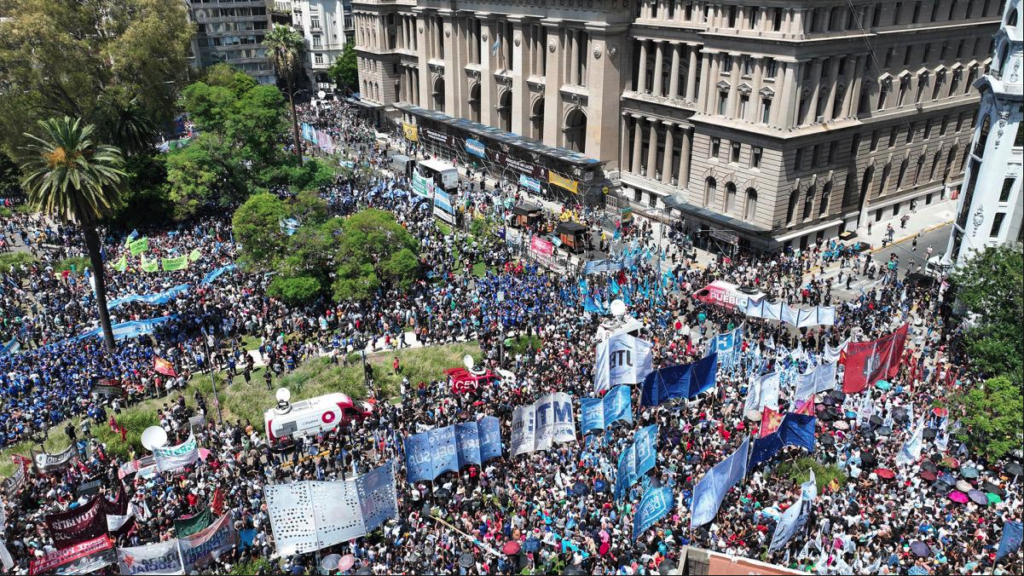
Published 12/27/2023 18:03 | Edited 12/31/2023 11:38
The General Confederation of Labor (CGT) and the two Argentine Workers Confederations (CTA), the main trade unions in Argentina, staged, this Wednesday (27), the third protest in just 16 days of President Javier Milei’s government. The act contests the mega presidential decree (DNU) that makes employment relationships more flexible and weakens union power, among other dismantling of the Argentine state, motivating an expressive demonstration that also brought together social organizations, left-wing parties and human rights groups.
The day of protests culminated in tensions between the Municipal Police and the protesters during the dispersion. However, national labor judge Ignacio Ramonet upheld the CGT’s complaint against the DNU, although he rejected the precautionary measure, arguing that the decree is not yet in force.
The mega decree, which comes into force this Friday (29), could be annulled by Congress, but the legislative process could extend until March. Given the urgency, the unions are seeking an injunction in court that would suspend the 366 changes to laws proposed by the decree, which is why they must appear in their thousands in front of the Court of Justice this afternoon. The text imposes, at once, more than 300 reforms that, among other things, repeal laws, eliminate dozens of state regulations, allow the privatization of public companies, open the doors to operations in dollars and begin to make the market more flexible. work and the health system.
Ultraliberal President Milei defends reforms as essential for economic recovery and accuses protesters of resistance to necessary changes. The government also warned of possible punishments for those who block public roads during protests.
“The Decree of Necessity and Urgency (DNU) dictated by President Javier Milei subverts the constitutional order by intending to legislate, attributing the sum of public power and, just as in his inauguration speech, turning his back on Congress”, accused the CGT in note.
The mega decree, which represents a type of labor reform, faces resistance from unions, who allege it is unconstitutional and accuse the government of legislating by decree, invading the sphere of competence of the Legislature. Among the contested measures are the reduction in worker compensation, the reduction in union revenue and the imposition of minimum percentages of activity in essential sectors even during strikes.
On Thursday (28), the 62 CGT unions must define a “struggle plan”, which may include calling a general strike. In response, President Milei has already announced that, if Congress annuls the decree, the government will call a plebiscite to ratify the reforms. With this, it appears to be facing bureaucracy and parliamentary corruption. He also says that this decree represents only a third of the measures he intends to complete soon.
He is a minority in both houses of Congress: in the Chamber of Deputies, the radical right has just 38 seats out of a total of 257; in the Senate, eight of 72. To achieve the measures he wants, Milei will need to negotiate with other political forces. In parallel with the judicial strategy, the unions also held meetings with opposition deputies and senators to expand their positions against the decree.
The confrontation between the government’s vision and union resistance calls into question the future of the proposed reforms and signals a turbulent period in Argentine politics. The demonstrations, under the anti-blockade protocol, reflect polarization and the search for labor and social rights amid the transformations proposed by the Milei government.
The first reactions against the DNU occurred after Milei read some of the measures on national television a week ago. Outraged Argentines banged pots on their balconies in different parts of the country, and hundreds of them marched to the gates of Congress in Buenos Aires to defend rights won over decades. After the Christmas break, demonstrations of repudiation resumed. On Tuesday, in the city of Buenos Aires alone, there were two rallies in front of Congress.
Massive protests
Since 11 am, thousands of people gathered in Plaza Lavalle, expressing their rejection of the profound deregulation of the economy. The demonstration, called by the General Confederation of Labor (CGT) and the CTAs, as well as several social and trade union organizations, became a stage for citizen expression in different provinces of the country.
In addition to Buenos Aires, in several provinces such as Córdoba, Santa Fé, Río Negro, Tierra del Fuego and San Juan, the demonstrations were replicated, with the epicenter being the massive march to the Palace of Courts in the City of Buenos Aires.
CGT leaders, such as Héctor Daer and Pablo Moyano, asked the Judiciary to act to block and annul the DNU. Furthermore, the possibility of calling a struggle plan that could include a general strike was raised.
The general secretary of the Metalworkers Union (UOM), Abel Furlán, described the DNU as unconstitutional and harmful to workers’ rights, denouncing a transfer of resources to the most concentrated sectors of the economy. Other unions, such as La Bancaria and the Federation of the Naval Industry, joined the protest, maintaining that the DNU is a declaration of war on unions and that they must face the fight in the streets.
Source: vermelho.org.br

